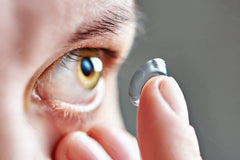
Why your eye health is so important and how to make informed decisions
It’s easy, especially when we’re young, to take our eyes for granted. If you’ve never had any trouble with them you’d be forgiven for getting professional advice.
However, perhaps you’re reading this because you’re managing something new with your eye health - from the signs and symptoms that you may need an eye test, to getting your first prescription, to deciding on contact lenses or glasses, and ways to maintain eye health.

Top 3 signs you may need to visit an eye care professional
As you know, your eyes are an incredibly complex organ and their health will change as you age.
While there are a number of common eye disorders - such as cataracts, glaucoma and macular degeneration - many people will experience less serious eye complaints over their lifetime.
- Blurred or fuzzy vision
Here’s a simple test if you think your eyesight is becoming blurred or fuzzy. Place a magazine or newspaper about 3 metres away and see if you can read the headline. If the lettering becomes fuzzy or you have to squint really hard, you may be developing nearsightedness. It’s also common for other people’s faces or objects to look blurred at distance.
Sometimes blurred vision doesn’t require any further action, but if rest and hydration don’t alleviate your symptoms then schedule an eye test.
- Difficulty on computer or phone
One of the most common issues we face in the digital world is the time we spend looking at electronic screens. You may be experiencing watery eyes, headaches or tension around the eyes and temple, or possibly even double vision with what’s on the screen.
Try resting your eyes for at least 30 seconds every 15-20 minutes by setting a timer on your computer or phone. If these symptoms continue for longer than a few days, a thorough eye examination could be in order.
- Seeing floaters in your vision
Another very common symptom people experience, which can be quite stressful at first, are the appearance of floaters in your vision. These floaters are benign flecks of the protein collagen.
As we age, these protein fibres begin to shred and clump together, causing shadows to be cast on your retina. You may have noticed this sensation when looking at certain objects, such as a blue sky or white screen.
These floaters could appear as black or grey dots, squiggly lines or even cobweb shaped.

While the chances are it’s nothing serious, more serious eye disorders associated with floaters are:
- Bleeding in your vitreous
- A detached or torn retina
- Inflamed vitreous or retina caused by infections
- Eye tumours
It always pays to get your eyes tested if these floaters don’t go away or become more frequent.
Finding a professional you trust and understands your eye history
Just like your trusted GP, finding an eye specialist - like buycontactsonline very own Optometrist Peter Merrett - who can undertake a full examination and understand your unique needs is very important.
It's advisable to get a recommendation for a trusted optometrist from someone who has had firsthand experience.
It's also a good idea to continue seeing the same optometrist to build a relationship with and to provide a complete history and understanding of your eyes over time.
The benefits of getting a thorough eye test from a trusted professional include:
- Accurate vision examination and correction
- Early detection of eye disease
- Eyewear advice for your lifestyle, including sunglasses
- Trialling the right prescription contact lenses for your lifestyle needs
- Gain insight into your full history, including family
- Monitor changes to your prescription and eyes as you age
Just like any other part of your body, your eye health with change over time. Having someone who has a complete history and understanding of your eyes is a great approach.
Advice on how to manage any eye conditions or simply just maintaining good eye health through diet and lifestyle choices are all part of an experienced optometrist’s job.



